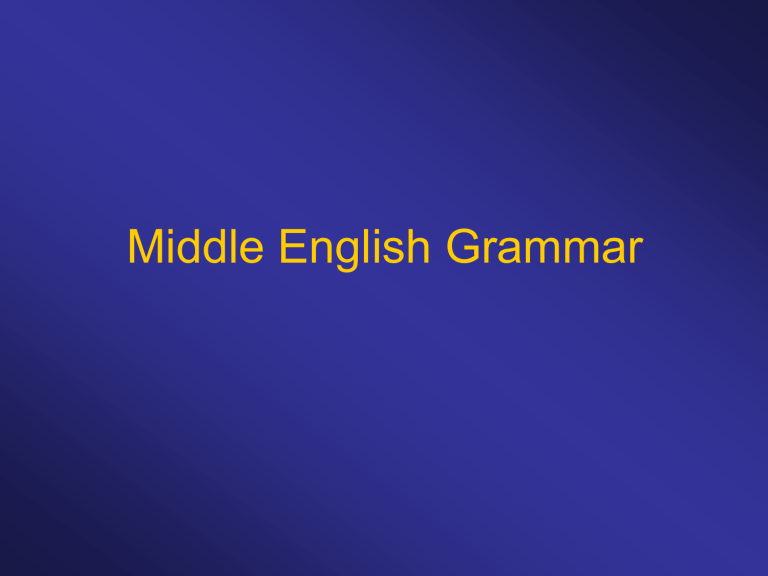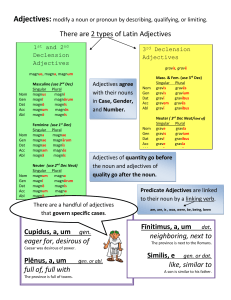
Middle English Grammar Middle English Grammar The structure of Middle English is radically different from the structure of Old English. Old English is a highly inflectional language. Middle English has very little morphology. Morphosyntactic changes 1. Simplification of inflection/morphology 2. Emergence of new grammatical devices: a. analytical verb forms b. rigid word order Noun declension Old English SG SG NOM stan stan-as GEN stan-es stan-a DAT stan-e stan-um ACC stan stan-as Noun declension SG Old English Middle English SG SG PL stan stan-es NOM stan stan-as GEN stan-es stan-a stan-es stan-es DAT stan-e stan-um stan stan-es ACC stan stan-as stan stan-es Noun declension South Old English SG SG PL Middle English SG PL NOM eag-a eag-an eye eye-n GEN eag-an eag-ena eye-s eye-n DAT eag-an eag-um eye eye-n ACC eag-an eag-an eye eye-n Relics of the -en plural in ME oxen children brethren Demonstratives that/the Masc Neut NOM GEN DAT ACC INST se þæs þæm þone þy: þæt þæs þæ:m þæt þy: proximal distal SG this that PL these those First and second person pronouns 1. person SG Subj ich, I Obj me Poss mine, mi 2. person PL SG we þu, thou us þe, thee ure, our þin(e), i PL ye, ye you, eu, yur(e), your Third person pronouns Subj Obj Poss 3S M he him his 3S F heo, sche hire, her hir(e), her(e) 3SN hit, it (h)it, him his 3 PL he,hi,thei hem,them here, thair Verbal inflection in Middle English Person: -s (3rd person) Number lost Tense -ed / Ablaut Mood lost Grammatical innovations Morphological cases were replaced by new word order patterns. Tense and mood affixes were replaced by new analytical verb forms. Analytic verb forms Future Perfect Passive Progressive Modal verbs will catch have caught is caught is catching can / may / must catch Future and swiche wolle have the kyngdom of helle, and not of hevene. ‘and such will have the kingdom of hell, and not of heaven’ Perfect (1) Ic hæbbe þo-ne fisc gefange-ne I have the-ACC fish caught-ACC ‘I have the fish caught’ (=I have the fish in a state of being caught) Progressive Participle (1) For now is gode Gawayn goande ryght here. For now is good Gawain going right here. Gerund (2) I am yn beldyng of a pore hous. ‘I am in (the process of) building a poor house.’ Why did English grammar change so much? • The stress pattern • The contact with Old Norse • The loss of an English standard




